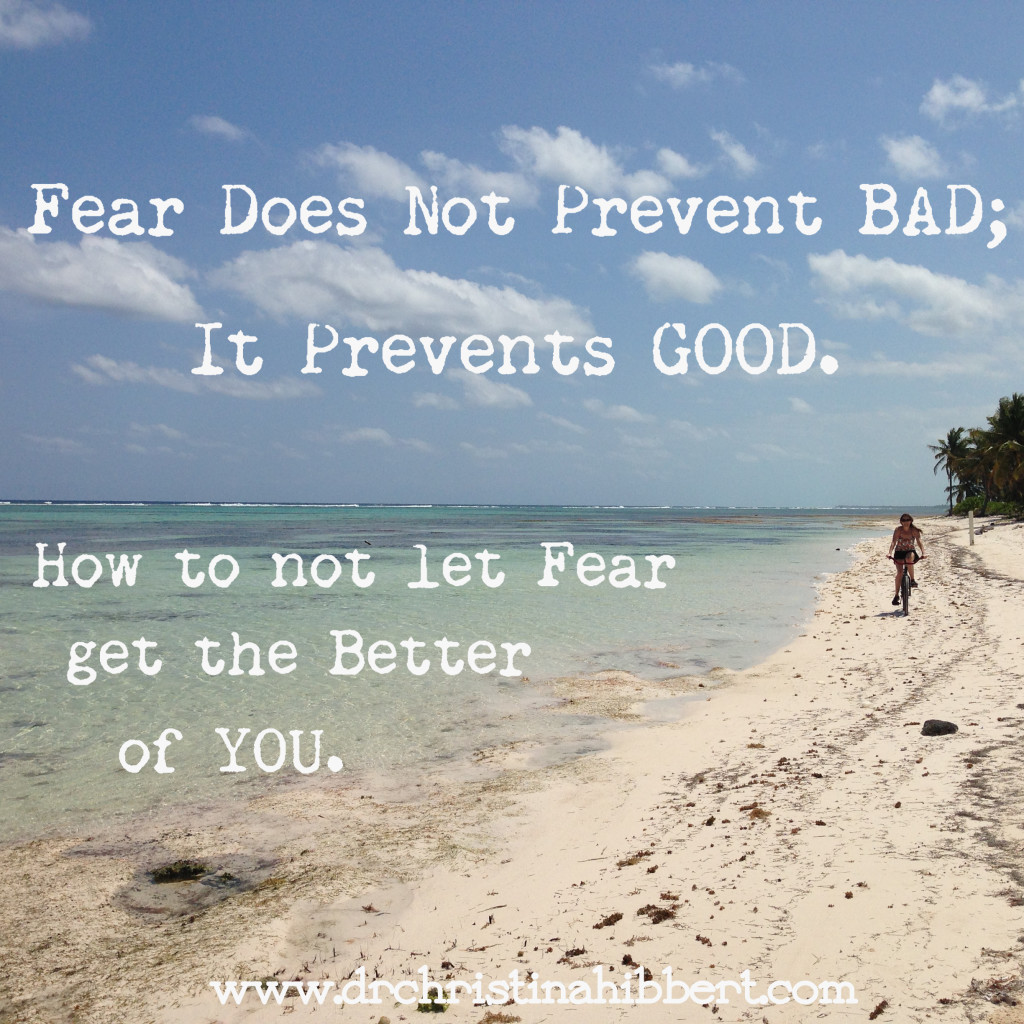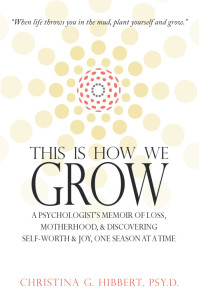
03 Apr “Fear Does Not Prevent BAD; It Prevents GOOD.” How to Not Let Fear Get the Better of YOU!
 Fear prevents good. That’s what I’ve learned. It’s an inhibitor. It stops us in our tracks. It keeps us from doing the things that might be really good for us.
Fear prevents good. That’s what I’ve learned. It’s an inhibitor. It stops us in our tracks. It keeps us from doing the things that might be really good for us.
Fear Doesn’t Prevent the BAD; It Prevents the GOOD.
But most people have it backwards. They think, “Fear prevents bad things from happening.” They think fear is a signal, telling us something terrible is going to happen if we don’t stop in our tracks right now! It’s true, historically, that our ancestors relied upon fear to warn them of dangers that were very real and present. Fortunately, most of us no longer live in such a physically threatening world. Unfortunately, however, many of us still experience and react to fear, even though, most of the time, the danger is neither real nor present.
Much of the time the danger is in our minds. Fear of flying, speaking, losing, failing, not being enough, dying—the list goes on. And when we heed the voices of fear, we stop. We panic. We lose our focus, and we ultimately prevent ourselves from engaging in the very goals we so desire to achieve.
Removing Fear’s Power
How does fear show up in your life? It’s an important question, for if you can recognize fear for what it is, you can choose to stop letting fear have its way with you.
I, like you, know fear firsthand. I’ve seen it show up in many forms in my life. I may not be afraid of public speaking or flying (in fact, I love them both), but I’ve felt that familiar catch in my chest more times than I care to admit. I wish I could say I never feel fear, but I do. A few examples from my life over the past weeks include:
1) Fear of going away alone for a few days to work on my book. With 6 kids, a husband, home, private practice, etc, I get to the point where I’m exhausted, and the only way to get this book done is with some solid time alone. Yet I feel fear every time I’m preparing to leave. Deep down, I know OJ and the kids will be fine (and so will I), but something always tells me not to go. It’s only after I’m on the road that I feel the exhale and know, “Yep. That was just fear talking again. Good thing I didn’t listen.”
2) Fear of taking an incredible new opportunity. A few weeks ago, I was approached by a publisher to write a book on Self-Esteem for them. At first, I didn’t believe it. I kept telling myself it probably wasn’t real. (You know how we do that to “protect” ourselves!). But, after a week, several conversations, and free books from them had arrived, I had to accept the truth: it was real. And I had to make a choice—to take this opportunity and run with it, or to let it slip, out of fear. I was afraid I wouldn’t be good enough; it’s a familiar fear for me. In fact, four years ago, when I started writing my first book (This is How We Grow, coming 2013!), I didn’t tell anyone I was writing it for 2 whole years. When I finally told someone, it was like this: “I’m writing this memoir, probably just for my family, I don’t know if I’ll actually publish it or anything.” I couldn’t call myself a writer for another year, until one day I just did. “I’m a writer.” I can say it freely now. But taking the risk of trying something new—of really putting myself out there—is always fearful for me.
3) Fear of failing as a parent. My oldest is taking his ACT in a couple of weeks. We’ve been looking at colleges. This came way too quickly for me, and I suddenly realize I’ve only got just over a year before they start flying the coop. Have I done all I set out to do as a parent? Not nearly. “What if I’ve failed them?” has been running through my mind constantly. Good thing I have a strong sense of self-worth and know I can always evaluate and re-think my parenting if needed. “Do you feel like you need to change something? If so, change it,” I remind myself. “Otherwise, let that fear take a hike!”
4) Fear of something bad happening. My husband and I just returned from a week in Belize–alone. It was wonderful. And, we  deserve it. It’s been two non-stop, packed with 6 kids’ activities and our careers and work and play, years since we went away, just the two of us. Yet, the day we were supposed to leave, all I could feel was anxiety. I’ve experienced tragedy before. I know it happens. And I know that voice that likes to remind me: “What if the plane crashes?” “What if we both die and leave all 6 kids alone?” I”ve become good at telling it to quiet down, but then starts: “It’s too hard to go away, you should just stay here.” “You’re going to fly all night? You’ll be a wreck! Why even bother?” The only way out for me is to remind myself that this is nothing new. This voice tries to stop me every time, and I don’t want to miss out on experiences like these because of a faulty voice in my head. Just look at these photos of us in Belize (yes, that’s me on the bike too! They’re a great reminder of what we might be missing out on when we give in to fear.
deserve it. It’s been two non-stop, packed with 6 kids’ activities and our careers and work and play, years since we went away, just the two of us. Yet, the day we were supposed to leave, all I could feel was anxiety. I’ve experienced tragedy before. I know it happens. And I know that voice that likes to remind me: “What if the plane crashes?” “What if we both die and leave all 6 kids alone?” I”ve become good at telling it to quiet down, but then starts: “It’s too hard to go away, you should just stay here.” “You’re going to fly all night? You’ll be a wreck! Why even bother?” The only way out for me is to remind myself that this is nothing new. This voice tries to stop me every time, and I don’t want to miss out on experiences like these because of a faulty voice in my head. Just look at these photos of us in Belize (yes, that’s me on the bike too! They’re a great reminder of what we might be missing out on when we give in to fear.
As I’ve worked on it, I’ve learned to hear that voice—the one that tries to stop me from doing the things that scare me but are good for me. I’ve become good at feeling the emotion and exposing that voice, calling it what it is, naming it: FEAR. And that’s what takes its power away.
Fear vs. Warning
You may be thinking, “But people do die, and fail, and horrible things happen,” and you’d be right. Of course, you’re right. But giving in to fear doesn’t help a thing. Fear doesn’t prevent the bad things from happening. It just doesn’t.
See, there’s a difference between fear and a warning. Think about it. When we are in tune, we may experience warnings that will prevent us from harm. You’ve likely experienced this yourself, but if you haven’t, you’ve no doubt heard others tell their stories of receiving a warning that prevented them from driving a certain way or getting on a plane or allowing their kids to do a certain activity. And later they recognized they had unknowingly prevented a great tragedy or harm. These are remarkable experiences, and I have been fortunate to have had a few in my life too. But the thing to focus on here is how people describe these experiences. They say, “I just felt like I shouldn’t go” or “I had this overwhelming feeling I needed to turn around”. This has been my experience too—an overwhelming feeling telling me what I must do, a feeling I listen to because it feels right.
Now think of fear. Every one us has experienced moments of fear. Some moments may have existed mostly in our minds, such as the fear of public speaking or performing. Some may have been in physically threatening situations—almost falling, getting injured, or threatened with death even. Either way, the experience was likely the same—blood pressure goes up, the heart starts to race, sensation may be lost in the extremities, including dizziness or lightheadedness. It probably felt out of control, and you were probably literally unable to control certain aspects of your body. It did not feel good. It did not feel “right”. You did not, most likely, even want to be feeling what you felt. You wanted it to be over. A different experience from those moments of warning, right?
How to Not Let Fear Get the Better of YOU.
So the next time you feel that panic, worry, anxiety, stop and ask yourself, “Is this a true warning? Or is this fear?” Name it for what it is. It can’t keep you afraid if you expose it. It can’t prevent you from doing something that feels scary but is probably really good for you if you stop, name it, and feel it.
Increase your attention to warnings. Listen and heed them. But, decrease your attention to fear. The only thing it’s good for is to notice the attempt it will make to prevent you from moving forward, to recognize you’re probably onto something really good, and then to thank it for that understanding and wish it well as you pass it on by.
How does fear show up in your life? What do you think about it preventing good? What strategies help you stop fear from getting the better of you? Please leave a comment below!
Be sure to check out Dr. Hibbert’s Amazon Bestseller, This is How We Grow–
available now on Amazon.com!
Join my This is How We Grow Personal Growth Group!
FREE. Online. Growth. What more could you ask for?
Don’t miss a thing!
SUBSCRIBE, below, “like” my Facebook pages (Dr. Christina Hibbert; This Is How We Grow) and follow me on Twitter,Pinterest, & Instagram!
You may manage your subscription options from your profile
[subscribe2]
Related Articles/Posts:
5 Skills of Overcoming: Depression, PPD, Grief, Stress, Hormones, etc.
Personal Growth & Self-Actualization
If Self-Esteem is a Myth, then what is the Truth?: Understanding Self-Worth
Fake It ‘Til You Make It: A Surefire Way to Prevent a Meltdown
How to Turn a Rainy Day Sunny: 5 Tips for Overcoming Feelings of Depression
Create the Life You Desire: Part 1, What’s Keeping You Stuck & How to Get Unstuck
10 Major Mistakes I’ve Made This Month (& Why It’s OK)
Let’s Get Real: 10 Confessions from “The Psychologist, The Mom, & Me”
Good Reads on Fear:
FEAR: Essential Wisdom for Getting Through the Storm, Thich Nhat Hanh
The Gift of Fear and Other Survival Signals that Protect Us From Violence, Gavin de Becker


What a great and timely article! You put something difficult and unnerving into plain and simple words. The advice to see fear for what it is and then to wish it well is wonderful! Thank you for this great article.
Thank you very much, Amy! I’m so glad it helps. And thank you for taking the time to leave a comment. I love hearing feedback! 🙂
Loved this article!
Getting the balance right between listening to our intuition and knowing when it’s our “fear” talking is tricky sometimes. I’m fearful pretty much every day about my career and abilities within it!! And don’t even get me started on how I feel about being a parent since that translates as terror rather than fear 😉
Looking fear and hesitation in the eye and just going for is one of the hardest things to conquer but produces some of the best rewards!
Thanks so much, Alice. You are right on–fear is the toughest to conquer, but so worth it when we do. And I’m pretty sure you’re not the only one with “terrors” about parenting! 😉
Christina, What I’d like to know is how do you tell when the fear is founded and is actually warning you not to do a particular thing rather than being something you should just push through? I am trying to decide whether to become a mother and am better at imagining a bad outcome than a good one, perhaps because my own childhood wasn’t a happy one, and because I feel like I haven’t been very capable in a lot of areas of my life.
Thank you for your question Sarah. It’s a great one. What I meant in the article is that “fear as a warning” doesn’t usually feel like “fear.” It doesn’t argue back and forth and get stuck in your mind and imagine bad outcomes. A warning is more of a knowing. It’s more of a deep sense that something is not right, that you need to stop and reevaluate what you’re about to do. For me, the more my mind produces “reasons” not to do something that scares me, the more it’s probably the fear trying to stop me from something that could be incredible.
I hope that helps. Becoming a mother is a huge decision, one that requires careful attention. But holding yourself back because of fear will probably lead to regrets someday. At least, that’s what I’ve found. Best to you.
Thank you so much for this beautiful article. Since having my daughter (now 2), I have been a huge ball of fear. I am trying to move through it and tease it apart, and the article has given me perspective and reminded me that fears are not facts, even though they can be so darn convincing in our minds!